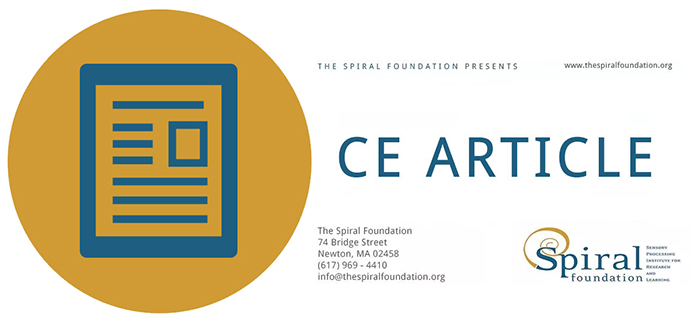Written by: Teresa May-Benson, ScD, OTR/L, FAOTA, Melanie Gomes, OT/s, and Olivia Easterbrooks-Dick, MS, OTR/L
originally published April 10, 2020
Self-Study Articles are scholarly articles on current topics related to sensory integration and sensory processing disorder.
Description: The terms “coping” and “coping skills” are often described in the literature as the way that individuals handle situations in daily life events and stressors. Studies suggest that individuals with sensory processing and integration difficulties struggle with areas related to coping, such as self-regulation and adaptive responses, which impacts their occupational performance. To support improved occupational performance in children with sensory processing challenges professionals must better understand the intricacies of this population’s coping abilities. This self-study details two studies and provides evidence that children with sensory processing and integration difficulties demonstrate lower coping skills than their neurotypical peer counterparts and that deficits in sensory processing relate to limited in coping in this population. This self-study discusses clinical reasoning for supporting the coping skills of children with sensory processing and integration challenges and utilizes sensory diets as a sample intervention.
Learning Objectives
By the end of this article readers will be able to:
- Define and conceptualize coping as it relates to adaptive responses in children with sensory integrative dysfunction.
- Explain the impact sensory integrative dysfunction and lack of coping skills may have on a child’s occupational performance.
- Explain how the study’s findings can influence occupational therapy assessment and intervention.
Course Level: Introductory. There are no prerequisites for this course.
Suitable For: Occupational therapists, OT assistants
AOTA
Domain: Areas of Occupation
Process: Intervention
Contact Hours: This course is worth 1.0 contact hours or 0.1 AOTA CEUs.
Completion Requirements: To receive contact hours for this course you must read the article in its entirety, and complete the accompanying assessment.
ADA/Section 504: If you require special accommodations, please contact the Spiral Foundation at admin@thespiralfoundation.org or (617) 969 – 4410 ext. 231.
Continuing Education:

Occupational Therapy Practitioners/ Occupational Therapy Assistants: The Spiral Foundation is an Approved Provider of Continuing Education for occupational therapists and occupational therapy assistants by the American Occupational Therapy Association. The assignment of AOTA CEUs does not imply endorsement of specific course content, products, or clinical procedures by AOTA.

